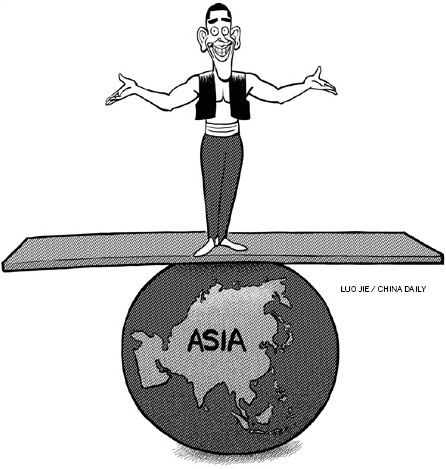Opinion
This is America's new Asia policy
By Wang Fan (China Daily)
Updated: 2010-06-04 14:10
 |
Large Medium Small |

Two points in America's "new Asia policy" deserve special attention: US President Barack Obama's deep interest in the continent and America's role in the post-global economic crisis era.
The US says it wants to "build new partnerships", but it has been "strengthening old allies" in Asia. So, the word "new" should be interpreted as paying more attention and allocating more resources to Asia.
Emerging powers in Asia - China, Russia, and India - pose a challenge to the US, countering which is the most important part of Washington's global strategy. Besides, keeping channels to Asian countries open is the bottom line of America's Asia policy.
US congressmen may debate whether Europe or Asia should get the priority in their foreign policy, but in reality the American administration has not neglected either of the continents. Its new Asia policy may then be related to the possible developments in the continent, such as the prospect of closer cooperation among East Asian countries.
The developments of the past few years have raised a new question: How will the US alternate its Asia strategy in the post-economic crisis era?
The answer comes in two parts. First, the US suffered a lot because of the economic crisis, but its influence upon Asia did not subside. In fact, just the opposite happened: The change in Asia's political landscape helped it strengthen its military presence in the continent. Second, the US would want status quo in Asia if its global strategy meets with difficulties.
A key point in America's Asia policy is the impossibility of any plan aimed at political restructuring. Since the Asian political landscape will not yield any benefit to the US, and the price for such a bold plan would be unbearably high, the US prefers status quo. Of course, the situation in the Middle East may be different because not many countries there can counter US influence.
In its grand strategy, the US is hesitating to choose between "constant expansion" and "moderate pull-back". There is likely to be some changes in its Asia strategy, though. In his book The Peace of Illusions: American Grand Strategy from 1940 to the Present, American scholar Christopher Layne has introduced a new concept to describe the US strategy: "off-shore balance grand strategy". It is different from the "offshore balancer" strategy, which John J. Mearsheimer talked about in The Tragedy of Grand Power Politics.
Layne writes the "off-shore balance grand strategy" has four key objectives: separating America from possible wars between Euro-Asia powers, avoiding US involvement in unnecessary wars for allied interests or so-called credits, protecting American soil from terrorist attacks, and raising America's power status in the international system while keeping open options for strategic actions.
Being multi-polar in essence, this policy is different from hegemony; it is made to tolerate the rise of emerging powers. It shifts the responsibility of defending Euro-Asian powers on themselves. The US only needs to help them gain more power for self-defense. Layne says the "off-shore balance grand strategy" should replace the existing US strategy because, for one, it would be more efficient and effective in defending American interests.
First, even if the US opts for Layne's "off-shore balance grand strategy" it would not make any strategic defensive gesture in Asia. On the contrary, the US might even involve more countries in its Asian affairs to leave an impression of expansionism. A perfect example is US Cold War-mentality think tanks' proposal that Washington take more interest in the countries that the Mekong River flows through with the primary aim of preventing a regional power from gaining dominance.
Second, the US would strengthen its network of allies, as it did in the 1970s. The only difference would be that it might opt for more multilateral cooperation.
Third, the US will not promote any form of Asian integration. The US support to European integration was born mainly out of the need to counterbalance the erstwhile Soviet Union. In fact, divide et impera has always been America's favourite policy. That's the reason why Germany was not reunified before the disintegration of the Soviet Union became imminent.
In Asia, the US cannot think of any integration without China. So, it has become a member of the Asia-Pacific Economic Cooperation. But it is there just a member, not to facilitate any cooperation.
| ||||
For the same reason, the US hopes to keep the rise of any country in the region under control. That means there is a balancing point between tension and rise of a country.
In this epoch, when Cold War is history, a sub-Cold-War in Asia would help the US the most to maintain what it calls balance and preserve its influence. That's also the key to US hegemony, or Western hegemony as a whole.
The author is a professor at the Institute of International Relations of China Foreign Affairs University.

